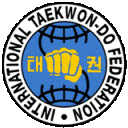 |
Student Theory |
 |
|
Next Page - Beginner Exercises and Patterns - Return to Contents It is important that the student masters all the work and techniques for their current grade before attempting to move onto the next level of training. All too often students become impatient and wish to learn techniques beyond their grade. This often leads to a student who has not mastered any technique correctly and whom will not perform very well at gradings. Remember once a muscle memory for a technique is developed it takes a long time to change it. If your instructor has not taught you a technique it will be for a good reason. Avoid by-passing your instructor and asking other students to teach you techniques. They may not have the full understanding of the technique themselves and you could end up performing the technique badly or totally incorrectly. The Beginning Student and Basic Skills
The White Belt Student probably has more to learn in three months than any other grade of student. They begin their Taekwon-do career with little or no previous knowledge of the Art. Naturally they will be nervous and in some cases have serious doubts about their ability to perform the techniques that TKD is renowned for. They may also have concerns about their fitness and flexibility. All these will develop and improve as they progress in their training.
All new students are nervous which will make muscles tense and will make their performance of techniques seem stiff and slow, increasing their energy use and making them more prone to tiring quickly. They will be acutely aware of their own mistakes and immediately assume that higher grades think they are stupid and clumsy. It is important that white belts realise that all the higher grades in front of them were white belts once and will have made all the same mistakes and struggled with the same problems and insecurities. Higher grades are expected to be supportive and encouraging when dealing with lower grades.
Impatience is a serious enemy of the new student especially when trying to learn new skills. A skill learned incorrectly will take far longer to put right than the same skill learned correctly at the outset. Muscle memory plays a huge part in learning Taekwon-do and if a technique is learned and practiced incorrectly the incorrect technique will become imprinted on the student making it very difficult to correct later. Whenever a student practices a new technique they should endeavour to do so exactly as explained by the instructor. Skills learned and practiced correctly as a white belt will ensure that the student progresses more easily at higher grades. A student who grades and progresses without being fully conversant with and able to perform each technique accurately will definitely struggle as they move into the higher grades.
Students should also train and perform every aspect of the art as they would in a real life encounter. It has often been said; “Fight as you Train; Train as you Fight;”, which means if you train soft and without commitment you’ll fight soft and without commitment, train hard and you’ll fight hard.
Beginning students will learn a range of basic co-ordination skills which bring together arms, hands, legs and feet into one co-ordinated action. It is expected that students will take at least 3 months to master these skills to the point where they will be ready to attempt their first grading.
Many of the techniques are initially developed in floor work exercises. This is your opportunity to really focus on performing a single technique correctly. Many students rush through these sessions without analysing their own technique.
The Instructor will use these sessions to ensure you fully understand the purpose and performance of each technique. If you do not master the individual techniques to the best of your ability it will reflect on the performance of your patterns and the art generally. If the instructor points out a correction in your technique, listen carefully and correct the move accordingly. All too often the Instructor will identify a technique which needs correcting and the student fails to develop the technique properly. This will slow down your development as the Instructor will need to focus on the same technique again until you are able to put things right. Take your time with each technique. Perform it at your own speed. Avoid copying anyone else (they may be doing it wrong!). If you don’t fully understand a command ask the Instructor to clarify it for you. Instructors aren’t psychic, they won’t realise there is a problem unless you tell them. They are there to help and guide you through your training. Next Page - Beginner Exercises and Patterns - Return to Contents
|
||